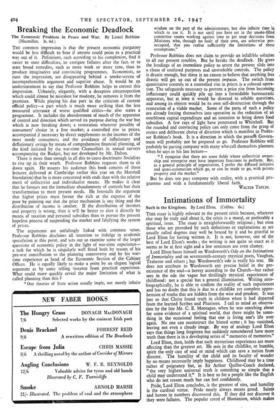Breaking the Economic Deadlock
The Economic Problem in Peace and War. By Lionel Robbins (Macmillan. 3s. 6d.)
THE common impression is that the present economic purgatory would be less difficult to bear if anyone could point to a practical way out of it. Politicians, each according to his complexion, find it easier to state difficulties, to castigate failures after the fact, or to state broad remedies, such as more work or more time, than to produce imaginative and convincing programmes. Economists, so runs the impression, are disappearing behind a smoke-screen of incomprehensible argument and superior abuse. It would be an understatement to say that Professor Robbins helps to correct this impression. Urbanely, elegantly, with a deceptive circumspection which could almost be mistaken for modesty, he removes it from the premises. While playing his due part in the criticism of current official policy—a part which is much more striking than the less measured utterance of worse qualified critics—he also states a programme. It includes the abandonment of much of the apparatus of control and direction which served its purpose during the war but which is now breaking down; a restoration wherever possible of consumers' choice in a free market; a controlled rise in prices, accompanied if necessary by direct supplements to the incomes of the most needy consumers; and the avoidance of inflationary and deflationary swings by means of comprehensive financial planning, of the kind initiated by the war-time Chancellors in annual surveys accompanying the Budget, but not developed by Mr. Dalton.
There is more than enough in all this to cause doctrinaire Socialists to rise up in their wrath. Professor Robbins requests them to sit down again. He assures his audience (his book consists of three lectures delivered at Cambridge earlier this year on the Marshall foundation) that he is more concerned with ends than with the relative merit of collectivist and individualist means. He makes it clear that he favours not the immediate abandonment of controls but their transformation to meet present needs. He forestalls the argument that higher prices must favour the rich at the expense of the poor by pointing out that the price mechanism is one thing and the distribution of income is another. If the distribution of incomes and property is wrong, then it will be better to alter it directly by means of taxation and personal subsidies than to pursue the present hopeless process of suspending the market and falsifying the system of prices.
The arguments are unfailingly linked with common sense. Professor Robbins disclaims all intention to indulge in academic speculation at this point, and sets out to examine some of the larger questions of economic policy in the light of war-time experience— a task for which he is singularly well fitted both by reason of his pre-war contribution to the planning controversy and by his war- time experience as head of the Economic Section of the Cabinet Offices. He is equally likely to make a point by an elegant logical argument as by some telling instance from practical experience. What could more quickly reveal the major limitation of what is called planning than this ?
" Our theories of State action usually imply, not merely infinite
wisdom on the part of the administrators, but also infinite time in which to use it. It is not until you have sat in the smoke-filled committee rooms working against time to get snap decisions from Ministers who, through no fault of their own, are otherwise pre- occupied, that you realise sufficiently the limitations of these assumptions."
Professor Robbins does not claim to provide an infallible solution to all our present troubles. But he breaks the deadlock. He gives the headings of an immediate policy to arrest the present slide into a chaos of confused purposes and unworkable controls. The policy is drastic enough, but there is no reason to believe that anything less drastic will get us out of the present impasse. The switch from quantitative controls to a controlled rise in prices is a colossal opera- tion. The safeguards necessary to prevent a price rise from becoming inflationary could quickly pile up into a formidable bureaucratic apparatus, but at least it would be directed to soluble questions, and among its objects would be its own self-destruction through the restoration of a viable market. Some of the parts of such a policy are already forcing themselves into operation as the reduction of an overblown capital expenditure and an intention to bring down food subsidies. A few rays of light have penetrated to Whitehall. But the rounded and convincing policy can only come from the grasp of events and deliberate choice of direction which is manifest in Profes- sor Robbins's book. It is a direction in which the preseigi Govern- ment will probably not be prepared to go. Professor Robbins will probably be parting company with many who call themselves planners when he says in his last lecture- " I recognise that there are some fields where collectivist owner-
ship and enterprise may have important functions to perform. But, as a general principle of organisation, I prefer the diffused initiative and quasi-automatism which go, or can be made to go, with private property and the market."
But he does not part company with reality, with a practical pro- gramme and with a fundamentally liberal faith.
WALTER TAPLIN.


































 Previous page
Previous page